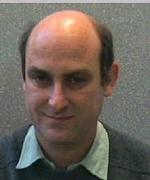CAZypedia celebrates the life of Senior Curator Emeritus Harry Gilbert, a true giant in the field, who passed away in September 2025.
CAZypedia needs your help!
We have many unassigned pages in need of Authors and Responsible Curators. See a page that's out-of-date and just needs a touch-up? - You are also welcome to become a CAZypedian. Here's how.
Scientists at all career stages, including students, are welcome to contribute.
Learn more about CAZypedia's misson here and in this article. Totally new to the CAZy classification? Read this first.
Difference between revisions of "User:Harry Gilbert"
| Line 1: | Line 1: | ||
Harry Gilbert | Harry Gilbert | ||
[[Image:gilbert.jpg|right]] | [[Image:gilbert.jpg|right]] | ||
| + | |||
| + | After working at Newcastle University since 1985 I have recently moved (November 2008) to the Complex Carbohydrate Research Center at the University of Georgia in Athens, USA. My major research interests are focused on enzymes that modify complex carbohydrates. I am interested in glycoside hydrolases and glycosyltransferases. I also have a generic interest in the mechanism of carbohydrate-protein recognition using non-catalytic carbohydrate binding modules (CBMs) as my model system. My research is focused on understanding the catalytic mechanism and the structural basis for the substrate specificity displayed by these enzymes. We use a combination of structural biology, primarily X-ray crystallography but also NMR, to determine the three dimensional structure of these enzymes, in combination with rational design and forced protein evolution to dissect how these enzymes work. | ||
Revision as of 03:44, 30 July 2009
Harry Gilbert
After working at Newcastle University since 1985 I have recently moved (November 2008) to the Complex Carbohydrate Research Center at the University of Georgia in Athens, USA. My major research interests are focused on enzymes that modify complex carbohydrates. I am interested in glycoside hydrolases and glycosyltransferases. I also have a generic interest in the mechanism of carbohydrate-protein recognition using non-catalytic carbohydrate binding modules (CBMs) as my model system. My research is focused on understanding the catalytic mechanism and the structural basis for the substrate specificity displayed by these enzymes. We use a combination of structural biology, primarily X-ray crystallography but also NMR, to determine the three dimensional structure of these enzymes, in combination with rational design and forced protein evolution to dissect how these enzymes work.
